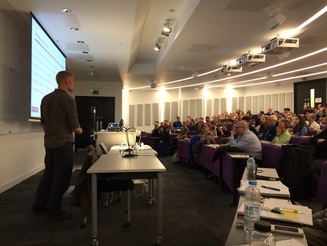
Kevin Anderson (1) presents “Triumph and Tragedy in Paris”;
followed by a Panel Discussion with Peter Styring (2) and Julia Carrell (3).
(1) Kevin Anderson is Professor of Energy and Climate Change and Deputy Director of the Tyndall Centre for Climate Change Research, University of Manchester.
(2) Peter Styring is Professor of Chemical Engineering and Chemistry at the University of Sheffield, Chair of the CO2Chem Network and an Associate Fellow in the Understanding of Politics.
(3) Julia Carrell is a Director of Sheffield Renewables, and a postgraduate researcher in Mechanical Engineering at the University of Sheffield.
- So what really happened at the December 2015 climate negotiations in Paris? Are we on track to bring climate change under control, and to keep within 2oC of warming? And if not, why not?
- Is there any urgency – or do we have plenty of time to sort things out, now that new low-carbon technologies are rapidly coming on-stream?
- What role can universities play in building a low-carbon path forwards? And why, on the whole, are they not as yet stepping up to the plate?
- What kind of leadership do we need – and who can we expect to provide it?
- What roles can we as individuals play?
1. Introduction
“The University is not doing enough to reduce emissions,” Christian Unger said by way of an introduction. [Link to Introduction start] As the founder and co-chair of the Carbon Neutral University Network (CNU), he explained what the targets are – and how far we are from reaching them. Whilst at the same time, all kinds of research is taking place within the University into low carbon technologies, and into communication and behaviour change. As he puts it, “If we as an institution with all the knowledge and money we have are not achieving these targets – who will?” He outlined how CNU is working to build bridges within the institution, develop solutions, and hold the University to account. By way of introducing Kevin Anderson, Christian argued that “we need to become carbon neutral within a timeframe relevant to climate change – not to the UK Government.”
2. Keynote speech by Kevin Anderson – ‘Triumph and Tragedy in Paris’
“Grey-haired and no-haired people have failed your generation.” As he opened his talk in the University’s iconic new – and high-emissions - Diamond Building, Kevin Anderson pointed to twenty-five years of inaction on climate change. Paris is a start – there is still an almighty gap between the Agreement as it stands now and the scale of action we need to take. Kevin explained why, in his view, many people and institutions that should be taking a lead in addressing this gap are not yet doing so. Crucially, this includes our universities. He presented us with the outline of a plan – how we really can keep within 2 degrees. But by crikey – do we need to get moving on it! You can find out much more, with links to excerpts and slides, here: [Link to Blog] [Link to video]
3. Panel discussion with Kevin Anderson, Julia Carrell and Peter Styring
So what can we do to make this happen? In the Panel discussion, [Link to Panel discussion start] the first question was about how we overcome the social and psychological obstacles to change. [Link to Panel 5.41] Then the different roles of poorer and richer countries in bringing about this change was explored. [Link to Panel 10.40] In the third question, the thorny question of economic growth on a finite planet reared its head. [Link to Panel 15.40] Question 4 was about building a movement, and moving from ideas into action. [Link to Panel 20.56] A question about diet came next – which led to all kinds of things, including which beer to drink to keep your conscience clear. (As the end of the event approached, perhaps the pub was drifting into the collective mind…) [Link to Panel 25.10] However – there was one more question to go. How do we open up conversations with our politicians and local leaders? Many doors may open more readily than we think. There is a role for us as constituents here. There is also a major role for universities – one which on the whole “academics run scared of”, Kevin suggests. Peter and Julia talked about how to make contact effectively. There was a whole blueprint for action in the answers to this question alone. [Link to Panel 30.13]
4. Summary
“There is an overwhelming message of urgency,” Rachael Treharne said in summing up the event. [Link to Summary start] As co-chair of CNU, she urged people to get involved. No-one needs to feel on their own with this challenge. The questions from the audience that we didn’t have time to answer in the event will go up on the website, and be used to keep this conversation expanding. The recording will go up there too – please promote it, circulate it to friends and colleagues. Finally she gave a vote of thanks; and directions to the pub.
Links to the full length videos:
- Introduction: https://www.youtube.com/watch?v=ZoqAHEM0YK0
- Keynote speech: https://www.youtube.com/watch?v=9gJ78vDU17Y
- Panel debate: https://www.youtube.com/watch?v=sdiXsnGRVbw
- Summary: https://www.youtube.com/watch?v=c9cK4j3gk_4
* * * *
Blog by Adam Howard, MSc (Human Ecology); Panel Chair and member of the Organising Team
| | |
| | |

 RSS Feed
RSS Feed